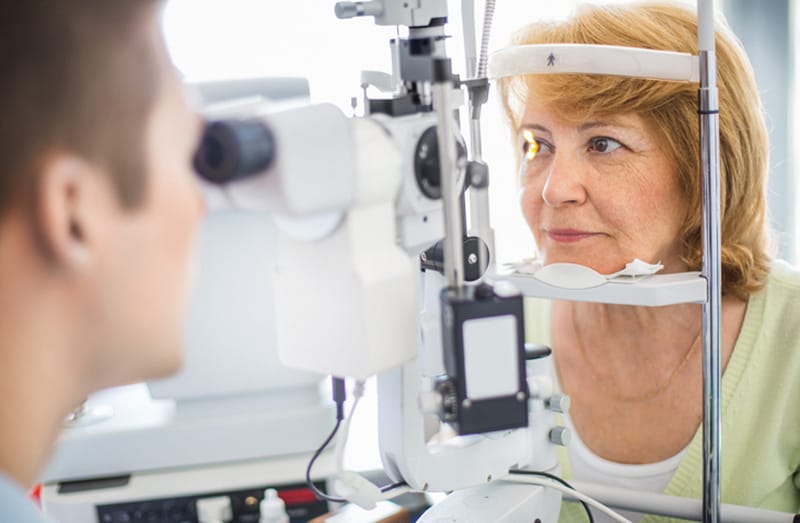Our eyes are our windows to the world. From reading to driving to watching our favorite shows, good vision is an essential aspect of our daily lives. However, over time the words on a page may become fuzzy. The eyes might feel constantly dry or overall vision may seem cloudy.
Eye issues like these are a common part of the aging process. Many issues can be easily corrected with glasses, contact lenses, or improved lighting. However, the risk for more serious eye diseases and conditions also increases with age, making it very important to know how to care for and protect aging eyes to prevent further damage.
The following are some of the most common eye conditions experienced by older adults:
- Dry eyes: Tear production begins to decline after age 40, and as a result, many people age 65 and over often experience symptoms of dry eyes. This can include burning, stinging, or a gritty sensation in the eyes. For mild dry eyes, over-the-counter drops can be helpful. For those with more serious or persistent symptoms, it is important to see an ophthalmologist.
- Eyestrain: Eyestrain from reading in low light or looking at electronic devices has become increasingly common. The eyes may feel tired, dry, itchy, or achy. Blinking more often, lubricating the eyes with drops, and giving the eyes a rest can help prevent eye strain.
- Glaucoma: Glaucoma is a leading cause of blindness in adults age 60 and over. It is caused by the inability of fluid to drain from the eye, which leads to a buildup of pressure on the optic nerve. The condition is painless, which makes it hard to detect until vision loss occurs. Regular eye exams test for glaucoma and can help prevent the condition from worsening.
- Floaters: Almost everyone has seen a floater — a tiny speck or string of gel-like fluid that passes across your eye. Often, they are no cause for concern. However, if an increase in floaters is noticed, talk to your doctor as this could indicate a serious issue such as a detached retina.
- Cataracts: Cataracts are caused by a breakdown of proteins in the lens of the eye, and can cause cloudy or blurred vision. Age, race, health conditions, and time spent in the sun can all play a role in how high a person’s risk is for cataracts. Surgery may be recommended if the condition interferes with daily life.
- Macular degeneration: Affecting more than 10 million people in the US, macular degeneration is another leading cause of vision loss. There is no known cure for it, but maintaining a healthy diet, exercising, not smoking, and protecting your eyes from harmful UV rays are all ways to prevent or slow its progression.
How Can You Protect Aging Eyes?
Protecting the eyes from damage and disease is crucial as we age. The number one thing older adults should do is schedule regular eye exams with either an optometrist or ophthalmologist. These exams allow health care professionals to catch and treat any conditions early to prevent further damage to your vision.
Other steps to take to keep aging eyes healthy include:
- Wear sunglasses that block UV radiation when you are outside.
- Follow a healthy diet.
- Do not smoke or quit if you currently smoke.
- Stay active and maintain a healthy weight.
- Monitor blood pressure to ensure it stays at a normal level.
- Manage diabetes (if you have it).
- Take regular breaks if you work in front of a computer or spend a lot of time focusing on one thing to prevent eye strain.
Healthy eyes are key to ensuring that seniors are not only able to see, but remain independent for as long as possible. Maintaining eye health throughout aging is easier with a dedicated partner by your side. The professional Sunrise elder care team at Jewish Family Home Care offers a wide range of in-home care services that can help seniors keep their eyes healthy, including:
- Planning and preparing nutritious, healthy meals
- Medication reminders
- Encouragement and assistance with physician recommended exercise
- Transportation to eye exams and other medical appointments
- And so much more!
If you’d like to learn more about how our elderly care in Pembroke Pines and the surrounding areas can help you and your loved one, contact us online or at 954-908-5677. Visit our Service Area page for a full list of the areas where we offer care.
